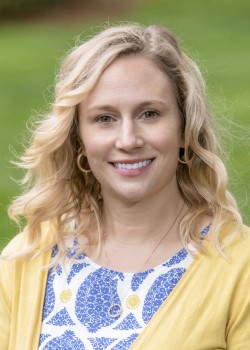
Katie Jobbins, DO, MS, FACP
Assistant Professor of Medicine
Associate Program Director Internal Medicine Residency Program
Wellness Council Co-Director for Baystate Health
UMass Chan Medical School-Baystate, Springfield, MA
1. What is your current professional position?
I am lucky I get to “do it all.” I am an Assistant Professor of Medicine at UMass Chan Baystate. As a medical education leader, I mentor, coach, and sponsor individuals across the academic medical continuum. In undergraduate medical education, I serve as a Longitudinal Preceptor and Capstone Advisor for our Population-based Urban and Rural Community Health (PURCH) students and serve on the PURCH admissions committee.
As an Associate Program Director for our Internal Medicine Residency Program, I hold the following roles: Resident Advisor, Director of the wellness curriculum, Co-Director of the humanities track, and Director of “Be the Change,” an interdisciplinary working group focused on health equity education and community advocacy.
For Baystate Health, I am the Wellness Council Co-Director, tasked with leading monthly interdepartmental meetings to examine institutional data on engagement and wellness and advise on strategies to reduce burnout among our faculty. I also co-direct an institutional-wide, longitudinal, peer mentorship program called “Mentors Matter.” My passion for wellness and mentorship extends beyond my institution to the regional and national levels.
I am currently President-elect of the Society of General Internal Medicine’s New England Chapter. For the Massachusetts American College of Physicians (ACP) Chapter, I have co-chaired the Council of Early Career Physicians (CECP) and currently serve as Well-being Champion.
2. Why did you choose internal medicine?
I originally started out my career in general surgery and realized I loved the relationship I could build with patients in internal medicine. I thought I would be a cardiologist when I changed residency but fell in love with internal medicine and being a medical educator. I love experiencing when trainees have that “Aha!” moment, establishing longitudinal relationships with patients, and advocating for our underserved patient populations.
3. What trends are you seeing in your day-to-day practice (with patients, the health care system, or otherwise)?
I predominately care for patients with large barriers to their medical care who often are viewed as the most vulnerable population, so creating care plans that include discussions about their SDOH has been a huge shift. I have also seen the health care system come together as it never has before given the COVID-19 pandemic—innovating and reimagining the future of GIM.
4. What do you want to accomplish professionally within the next five years?
Over the last few years, I have delved deep into the world of professional coaching. I even went so far as to get certified. I would like to establish and create programs for physicians around coaching and self-actualizing their goals both personally and professionally.
5. Can you share a brief (and anonymous) patient encounter or professional situation that made you proud to be an Internal Medicine physician?
Recently, I was shocked when a resident told me, “I want to be like you…a woman leader in medicine.” I was shocked, laughed out loud, and thought, “NO! I am not a leader.” This then led to a deep discussion about how we create and curate our futures. If we don’t ask for what we want it will never come to life. I explained how for me, it was through self-reflection, difficult conversation, and a very nonlinear path that I found my way. I encouraged her to create the future she wants with thoughtful introspection and by being brave enough to ask for what she wants. I find the journeys of the trainees around me to be the most exciting to watch.

